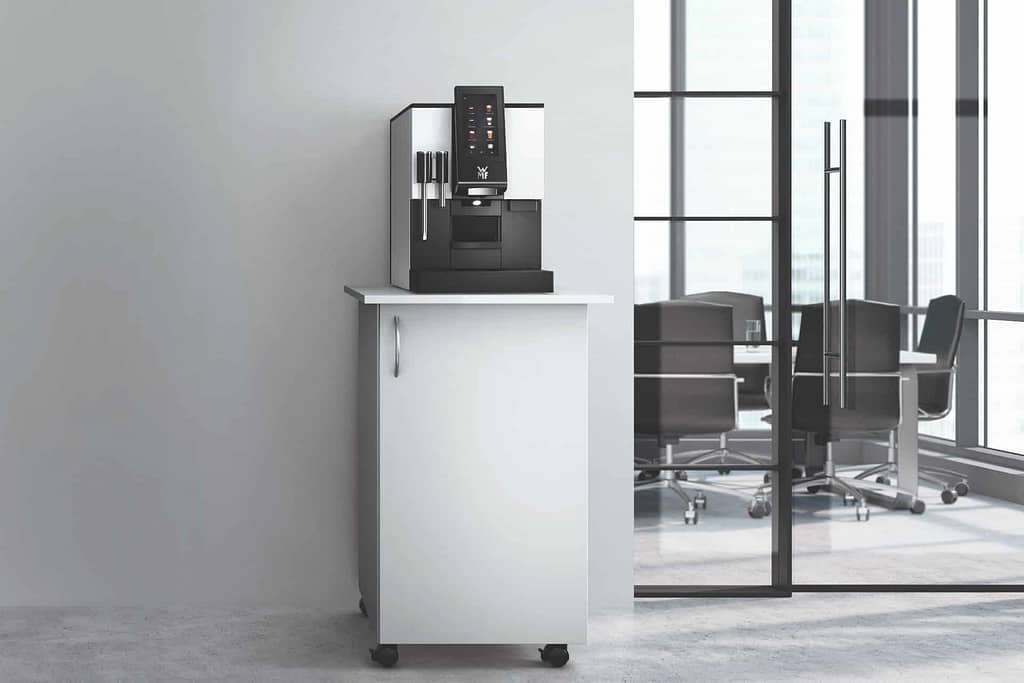Discover why the WMF range of coffee machines are suited to the office coffee market, and why its 1100S could be the very machine that entices staff to their city desks.
As more workers find their way back to office spaces and businesses lure employees back into social settings, having access to high-quality coffee just metres away is becoming a necessity, not a consideration.
To cater to office masses with a machine that is easy-to-use and still delivers the quality Australians expect, leading coffee machine manufacturer WMF has designed the 1100S fully automatic coffee machine.
“The 1100S is one of WMF’s newest models and is specifically designed for the office market. It runs on a standard 10- amp power supply, so you can simply plug and play on your benchtop,” says Hamish McKinstry, National Sales Manager of Australian Beverage Corporation, who is the exclusive distributor of WMF products in Australia and New Zealand.
“It can also operate off its internal water tank, which alleviates a lot of those obstacles and hurdles that many offices have with making sure you have the right power and plumbing before installing a commercial coffee machine.”
The differences between WMF machines within the range come down to size and capacity. Hamish says the 1100S is recommended for up to 80 cups a day and is more than sufficient for most offices. Other models, such as the 1300 S and the 1500 S+, increase output for up to 120 and 200 cups respectively, but it also means increasing footprint and power requirements.
He adds that WMF’s larger models, while operating in the same way, are best suited to catering venues, hotels, and larger offices with greater power supply, and higher volume demand.
When designing a coffee machine for the office, Hamish says the most important factors are quality, footprint, and aesthetic.
“It has to be a small footprint that can easily be situated in a typical office kitchenette,” he says. “In terms of aesthetic, [the 1100S] is clean and sleek, perfect for a modern office space.”
The machine is the smallest across the WMF range at 50 centimetres heigh and 32.5 centimetres wide, which Hamish says makes it a practical office solution with minimal bench space required.
“You can move it around from office to office, or kitchenette to kitchenette,” he says. “You can situate the 1100S anywhere without having to change any power, joinery or plumbing services.”
Usability is also at the forefront, with the user-friendly and interactive touchscreen comparable a larger version of a smartphone, with beverages icons and operational menus clearly visible for the user to select.
“Navigating, customising, cleaning, and all other options are displayed on the screen, and the user interface guides you through all the required steps of what needs to be done. For example, if [the machine is] low on water, it will display an animated graphic that will alert the user,” Hamish says.
He says one of the more exciting and innovative features of the WMF range is its CoffeeConnect telemetry system, which tracks the machine’s performance, output, and servicing needs.
“We can connect to every machine remotely from our head office,” Hamish says. “We update recipes, marketing images and even provide insights on what people are drinking on an hourly basis, all without having to physically be on-site.”
He says the stigma around office coffee machines is a thing of the past with the increased quality of super-automatic coffee machines, and more specialty roasters like Industry Beans and Axil Coffee Roasters are collaborating with WMF.
“The technology of automatic coffee machines 10 years ago was much different to what it is today,” Hamish says. “[WMF machines] use whole beans and fresh milk, and through their advanced brewing system, provides office workers the same experience they would get at a café.
“The milk system is first class, and Australians love their lattes and flat whites.”
Hamish notes the large increase in specialty roasters inquiring about WMF machines is a result of more roasters looking to expand their offer into the office market, and needing machines that can deliver the quality they are known for.
“A lot of specialty roasters have an existing presence in the CBD, so they are currently serving a large corporate demographic. They can further drive their offering into the workspace as their brands are already recognised by this market from their café and retail venues,” he says.
Hamish adds that providing high- quality coffee in the office is also a way businesses can encourage their employees back into the workplace.
“The average coffee consumer now has a greater palate. People won’t settle for anything less.”
For more information, visit www.ausbeverage.com.au
This article appears in the October 2023 edition of BeanScene. Subscribe HERE.


